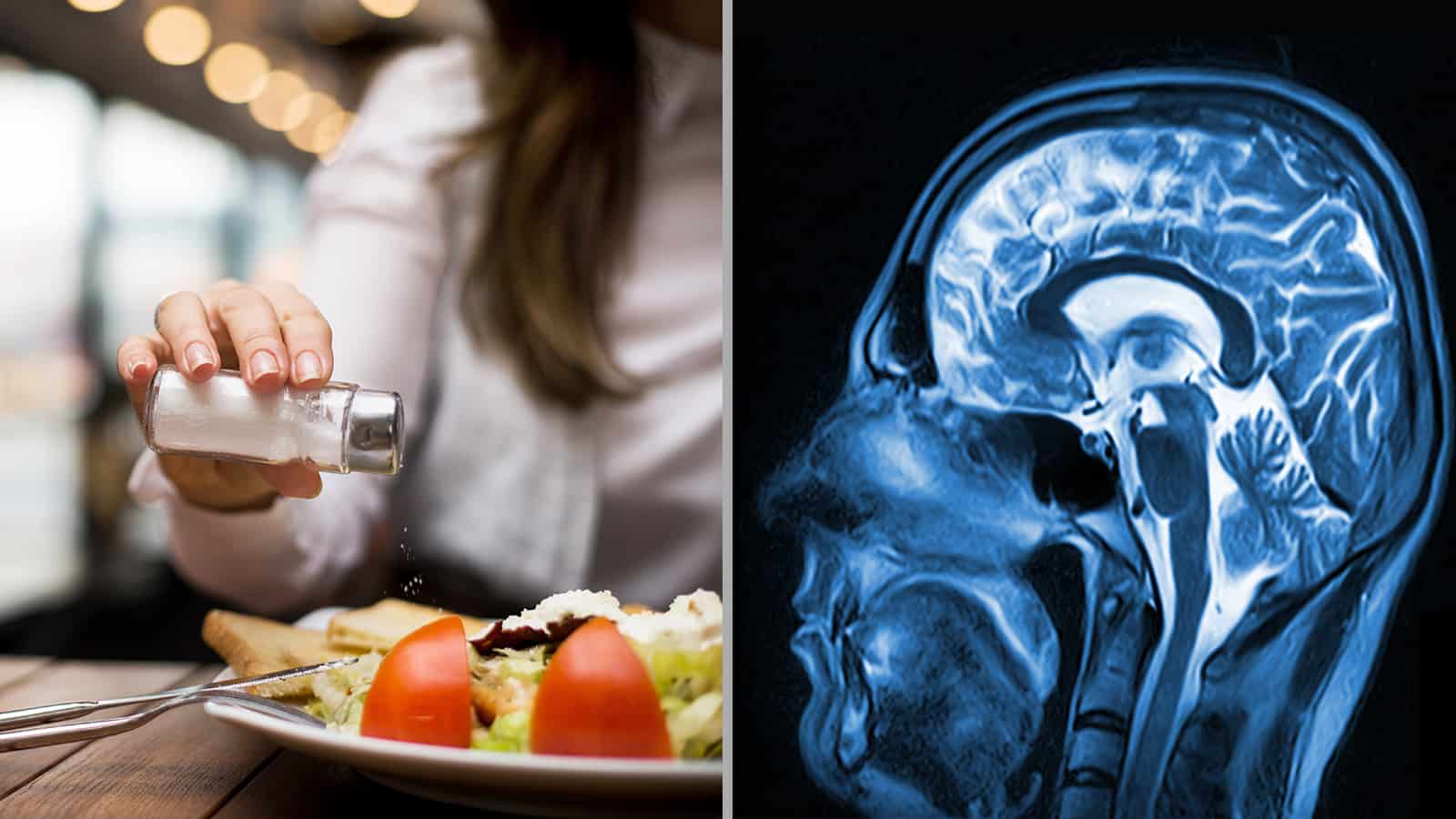A revolutionary Georgia State University study uncovered surprising new information about how salty foods affect the brain. The research focused on the relationship between neuron activity and blood flow deep within the brain.
When neurons become activated, blood flow increases rapidly to the area. Known as neurovascular coupling, or functional hyperemia, this process occurs when blood vessels called arterioles dilate. Neurovascular coupling forms the foundation of functional magnetic resource imaging (fMRI). Experts rely on this concept to diagnose brain disorders, looking for restricted or weak blood flow areas.
Prior studies on neurovascular coupling have only focused on superficial brain areas, such as the cerebral cortex. Scientists primarily analyzed how sensory stimuli, such as visual or auditory, affected blood flow.
However, scientists knew very little about whether these processes occurred the same way in deeper parts of the brain before this study. These brain regions process stimuli produced by the body, known as interoceptive signals.
A team of scientists collaborated on the study to examine these processes in deep areas of the brain. Dr. Javier Stern, professor of neuroscience at Georgia State and director of the university’s Center for Neuroinflammation and Cardiometabolic Diseases, led the study. The scientist team developed a new approach that combines surgical methods and advanced neuroimaging.
The team’s research focused on the relationship between salty foods and the hypothalamus, an area deep within the brain responsible for critical bodily functions. These include drinking, eating, reproduction, and regulating body temperature.
The study, published in the journal Cell Reports, examined how salty foods affected blood flow to the hypothalamus.
Researchers Explain the Link Between Eating Salty Foods and Brain Health
“We chose salt because the body needs to control sodium levels very precisely. We even have specific cells that detect how much salt is in your blood,” said Stern. “When you ingest salty food, the brain senses it and activates a series of compensatory mechanisms to bring sodium levels back down.”
The body accomplishes this partially by activating neurons which result in the release of vasopressin. In fact, this antidiuretic hormone plays a critical role in maintaining the right amount of salt in the body.
Previous studies on how salty foods impact the brain discovered a positive association between neuron activity and increased blood flow. However, researchers observed the opposite in this study: blood flow decreased when neurons in the hypothalamus became activated.
Stern said this:
“The findings took us by surprise because we saw vasoconstriction, which is the opposite of what most people described in the cortex in response to a sensory stimulus. Reduced blood flow is normally observed in the cortex in the case of diseases like Alzheimer’s or after a stroke or ischemia.”
The team called this phenomenon “inverse neurovascular coupling,” or hypoxia due to blood flow slowing down. They also found other interesting differences in the study about salty foods affecting the brain compared to previous findings. Blood vessel dilation in the cortex occurs in a highly localized, rapid fashion. However, in the hypothalamus, the response occurred in a dispersed, slow manner over some time.
“When we eat a lot of salt, our sodium levels stay elevated for a long time,” said Stern. “We believe the hypoxia is a mechanism that strengthens the neurons’ ability to respond to the sustained salt stimulation, allowing them to remain active for a prolonged period.”
This study warrants further investigation into how high blood pressure caused by eating salt may impact the brain. Researchers have found that 50-60% of hypertension results from overindulgence in salt.
Facts about Hypertension From the CDC
- In 2017, the American College of Cardiology and the American Heart Association published new guidelines for managing high blood pressure. They defined hypertension as blood pressure at or exceeding 130/80 mmHg. Stage 2 hypertension occurs when blood pressure remains at or above 140/90 mmHg.
- High blood pressure increases the risk of a heart attack or stroke, both leading causes of death in the U.S.
- In 2019, high blood pressure directly caused or contributed to over 500,000 deaths in the United States.
- Nearly 50% of adults in the United States (47%, or 116 million) have hypertension or take medicine to manage it.
- However, only about 1 in 4 adults (24%) with hypertension adequately managed their condition.
- About half of adults (45%) with uncontrolled hypertension have a blood pressure defined as Stage 2 hypertension. This includes 37 million U.S. adults.
- It’s believed that about 20% of adults with high blood pressure don’t know they have it.
- Hypertension disproportionately affects people in the South and Midwest, along with men and people of color.
Causes of Hypertension (the Downside of Eating Salty Foods)
- Modifiable Risk Factors: unhealthy diets (eating too many salty foods, excess saturated or trans fat, low fruit, and vegetable consumption), sedentary lifestyle, consumption of tobacco and/or excessive alcohol, and being overweight or obese.
- Unmodifiable Risk Factors: family history, being over 65, co-morbidities including diabetes or kidney disease.
Preventing High Blood Pressure
- Reduce salty foods to less than 5g of sodium per day
- Consume more fruits and veggies (at least five servings per day)
- Get at least 150 minutes of moderate to intense exercise each week
- Avoid smoking and reduce or eliminate alcohol
- Watch your saturated fat intake, as this can increase hypertension risk
Managing the Condition
- Reduce and manage stress. Yoga, meditation, walks in nature, deep breathing, aromatherapy, and mindfulness can help.
- Keep tabs on your blood pressure.
- Make sure to take any medications and properly manage co-existing conditions.
Final Thoughts on How Researchers Revealed That Salty Foods Affect the Brain
The Georgia State University study found that salty foods restrict blood flow to the brain. Over time, excess sodium intake can lead to cognitive decline because of decreased oxygen.
In the future, the team wants to study the inverse neurovascular coupling mechanism in animal subjects. Indeed, this would help determine whether the phenomenon contributes to salt-dependent hypertension. Furthermore, they hope to apply their findings to other brain regions and conditions, including depression, neurodegenerative diseases, and obesity.
“If you chronically ingest a lot of salt, you’ll have hyperactivation of vasopressin neurons. This mechanism can then induce excessive hypoxia, which could lead to tissue damage in the brain,” said Stern. “If we can better understand this process, we can devise novel targets to stop this hypoxia-dependent activation and perhaps improve the outcomes of people with salt-dependent high blood pressure.”















 Community
Community

